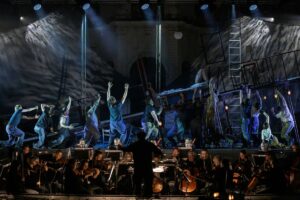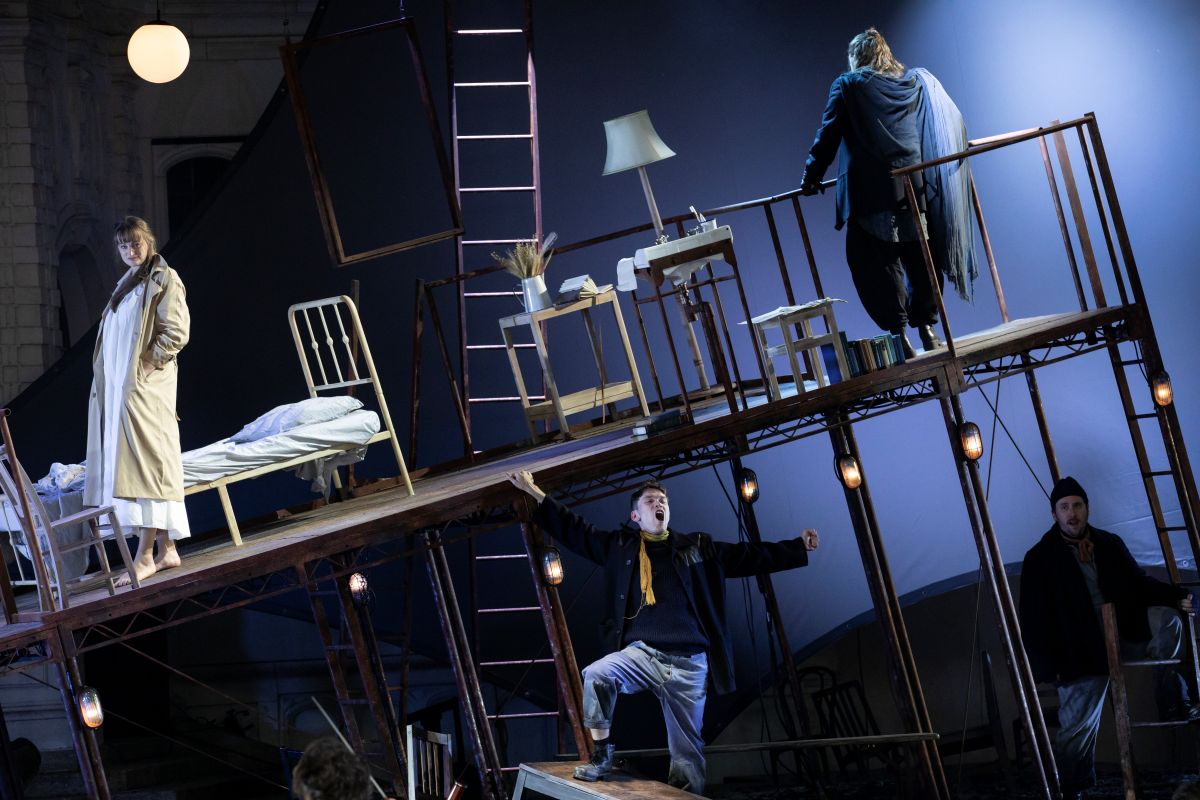Richard Wagner remains one of opera’s most polarising figures — a revolutionary composer with a tumultuous personal life. Known for living extravagantly beyond his means, Wagner often borrowed money he never repaid and had complicated relationships with friends, patrons, and lovers. His marriage to Cosima, formerly the wife of his devoted conductor Hans von Bülow, was marked by infidelity. Yet amid the scandal and excess, Wagner was also a master of myth and music — writing his own libretti and reshaping opera into something monumental.
The Flying Dutchman was born of real-life turmoil. In 1839, fleeing creditors in Riga, Wagner and his wife made a perilous sea crossing to England. A violent storm forced their ship to take shelter in the Norwegian fjords, where he heard tales of the ghostly captain Vanderdecken — condemned to roam the seas for eternity unless redeemed by a faithful woman’s love. Inspired, Wagner began composing Dutchman immediately. His version centres on Senta, who becomes consumed by the legend and ultimately sacrifices herself to free the Dutchman from his curse.
Wagner’s score overwhelms and enthrals. It requires enormous orchestral and vocal forces and is laced with ideas that would later evolve in The Ring — echoes of Valkyries, enchanted helmets, and looming giants are all hinted at here. The wind whips through the music as if part of the storm itself.
Julia Burbach’s new production at Opera Holland Park is bold but often confusing. The ghostly ship never materialises; instead, billowing cloths suggest Daland’s vessel and perhaps the Dutchman’s. During the overture, girls dressed like Senta wander through the audience, obsessing over the Dutchman’s portrait — past victims or future ones? Silent, veiled male figures — presumably the ghostly crew — also pass through the crowd, but the spectral chorus sings from the back of the stage. These men never sing or interact with the music: who are they meant to be?
The set, an apron-shaped stage wrapping around the orchestra, includes a sloped ramp and Senta’s elevated bedroom. But the spatial distance sometimes weakens dramatic connection. Even in their pivotal duet, Senta and the Dutchman barely look at each other. The finale fizzles: Senta does not leap into the sea but walks quietly away. Has the ending been reimagined? Is there no sacrifice — and therefore, no redemption? It’s ambiguous. The famous spinning chorus has no spinning, and the drunken sailors’ dance lacks verve. An inexplicable trapdoor between Senta’s bedroom and the stage below creates awkward transitions.

Despite these inconsistencies, the musical performance is outstanding, with a cast that rises above the visual abstraction.
Welsh bass-baritone Paul Carey Jones, a seasoned Wotan, makes an excellent role debut as the Dutchman. His commanding stage presence and dark, expressive tone bring depth to a tortured figure. He reveals not just doom, but guilt — a subtle shift that humanises the legend. His German is clear and expressive.
Scottish soprano Eleanor Dennis gives a compelling performance as Senta. Initially light in tone, her voice gains power and emotional weight as Senta’s obsession deepens. Her performance of the ballad is particularly striking, even if some of the diction could be clearer.
English tenor Neil Cooper brings intensity to Erik, Senta’s rejected lover. His singing is strong and increasingly physical — perhaps overly so, suggesting the seeds of future violence. His German, aided by his academic background in German literature, is the most assured of the cast. His dream aria is delivered with stirring urgency.
As Daland, Senta’s opportunistic father, Robert Winslade Anderson sings with a warm, lyrical tone. His portrayal leans toward the genial, which slightly undermines the darker implication of a father willing to barter his daughter for fortune. Some vocal strain and excessive vibrato appear, but overall his performance is convincing.
A notable voice to watch is Angharad Lyddon as Mary. Though a minor role, Lyddon brings warmth and presence, hinting at future greatness.
Colin Judson delivers a confident performance as the Steersman, rounding out a strong cast.
Despite some conceptual flaws, this is a rewarding evening for Wagner lovers. With brooding atmosphere, supernatural storytelling, magnificent orchestration, and commanding voices, The Flying Dutchman remains a powerful meditation on obsession and redemption — one that continues to challenge and inspire.
Music and libretto by Richard Wagner (1813-1883)
First performance Theatre Royal, Munich, 22 September 1869
Conducted by Peter Selwyn
Directed by Julia Burbach
Set Designer Naomi Dawson
Photo Credit Pablo Strong and Ali White
Cast includes Paul Carey Jones, Eleanor Dennis, Robert Winslade Anderson, Neal Cooper, Angharad Lyddon, Colin Judson
Running time 2 hours 50 minutes with one interval.
Performances until 14 June ( 5,7,12 and 14th June)

